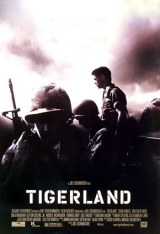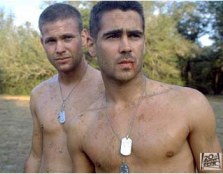| Tigerland |
| |
 |
USA, 2000. Rated R. 100 minutes.
Cast:
Colin Farrell, Matthew Davis, Clifton Collins Jr., Tom Guiry, Shea Whigham,
Russell Richardson, Nick Searcy, Cole Hauser, Afemo Omilami, James MacDonald
Writer: Ross Klavan, Michael McGruther
Music: Nathan Larson
Cinematographer: Matthew Libatique
Producers: Beau Flynn, Steven Haft, Arnon Milchan
Director: Joel Schumacher
LINKS
|
 nyone
up for a Vietnam boot camp movie? Anyone? It's supposed to be good, really.
It's no Gomer Pyle. What's that? You've had a long week and you'd rather see
The Wedding Planner? Your boss
has been difficult, and you're not in the mood for two hours of hazing by a
drill sergeant? Well, I can't blame you. Maybe next week, or the week after.
nyone
up for a Vietnam boot camp movie? Anyone? It's supposed to be good, really.
It's no Gomer Pyle. What's that? You've had a long week and you'd rather see
The Wedding Planner? Your boss
has been difficult, and you're not in the mood for two hours of hazing by a
drill sergeant? Well, I can't blame you. Maybe next week, or the week after.
Writing this from rural Montana, I'm not sure how well Tigerland has
done at the box office, but my guess is its run was over fairly quickly. [Editor's
Note: Yep.] This is a shame because it's a very good and very watchable
movie. Set in the jungles of a training ground in the southern United States,
Tigerland has a number of obstacles to overcome. As a Vietnam movie without
the actual Vietnam, the subject matter will be less than intriguing to many,
and may seem shopworn to others. Haven't there been enough films based on the
war itself and its impact back home? Didn't Full Metal Jacket already
tackle Vietnam boot camps? Well, maybe, but there's always room for a well-written,
well-acted film regardless of subject matter–even one directed by sometime shlockmeister
Joel Schumacher (St. Elmo's Fire; Batman and Robin; 8MM).
It goes without saying that Tigerland marks a departure for Schumacher
and is a breakout opportunity for star Colin Farrell. But beyond that, there
are a number of things to recommend. For one, Tigerland resists the usual
story arc involving "transformation" in one form or another by the lead character.
Hollywood loves transformation stories, particularly where war is concerned.
 This
would typically be where a wide-eyed recruit's initial naiveté is transformed
into maturity and real understanding, or the reverse, where a recruit's initial
cynicism is transformed into maturity and real understanding. Both the naïve
recruit and the cynical recruit typically end up in the same place by the end,
which is to say admirable by virtue of having learned and internalized an important
lesson. Hollywood can't get enough of lessons and learning and wants so badly
to teach, to impart neat little packets of wisdom in two hours. It's characteristic
of most 'serious' studio films that they are mainly just adult versions of After-School
Specials–civics lessons for your $8.00.
This
would typically be where a wide-eyed recruit's initial naiveté is transformed
into maturity and real understanding, or the reverse, where a recruit's initial
cynicism is transformed into maturity and real understanding. Both the naïve
recruit and the cynical recruit typically end up in the same place by the end,
which is to say admirable by virtue of having learned and internalized an important
lesson. Hollywood can't get enough of lessons and learning and wants so badly
to teach, to impart neat little packets of wisdom in two hours. It's characteristic
of most 'serious' studio films that they are mainly just adult versions of After-School
Specials–civics lessons for your $8.00.
AboutFilm.Com
The Big Picture
|
| Alison |
-
|
| Carlo |
B+
|
| Dana |
B+
|
| Glenn |
-
|
| Jeff |
-
|
| Kris |
B+
|
| ratings explained |
To its credit, Tigerland doesn't aim for dramatic transformations of
one sort or another, but sticks to smaller and less hackneyed terrain. Here,
the lead character, Bozz (Farrell), is pretty much the same from start to finish.
He has his contradictions throughout and deals with developments as they come.
He redeems himself in certain ways, but not in a manner that requires an epiphany,
or that is otherwise at odds with his character.
Without giving away too much of the plot, the primary tension is the development
of hostilities between him and another recruit, Wilson (Shea Whigham), during
the course of training. The conflict culminates in the final week of training,
which takes place at "Tigerland," a mock Vietnam involving war games between
competing platoons. Here, the film runs into its only real problem. Lacking
the mortal danger of the real Vietnam yet still needing to impart a sense of
real threat, it resorts to a characterization of Wilson as psychotic. It's difficult
to believe that some of the behavior he exhibits openly in front of Army brass
would be tolerated to the extent that it is. Not having been there I may be
wrong, but it seems that flagrant attempts at murder (by holding a loaded gun
to another recruit's head and shooting, only to have the gun jam, for example)
would be grounds for dismissal. The film's attempt to rationalize this (saying
in effect psychotic killers were needed for Vietnam) is not entirely convincing.
But in any event, this is a very good movie. Don't worry if you're not in the
mood for the subject matter–it draws you in quickly and is a treat to watch.
Review © February 2001
by AboutFilm.Com and the author.
Images © 2000 Fox and its related entities. All Rights Reserved.

 This
would typically be where a wide-eyed recruit's initial naiveté is transformed
into maturity and real understanding, or the reverse, where a recruit's initial
cynicism is transformed into maturity and real understanding. Both the naïve
recruit and the cynical recruit typically end up in the same place by the end,
which is to say admirable by virtue of having learned and internalized an important
lesson. Hollywood can't get enough of lessons and learning and wants so badly
to teach, to impart neat little packets of wisdom in two hours. It's characteristic
of most 'serious' studio films that they are mainly just adult versions of After-School
Specials–civics lessons for your $8.00.
This
would typically be where a wide-eyed recruit's initial naiveté is transformed
into maturity and real understanding, or the reverse, where a recruit's initial
cynicism is transformed into maturity and real understanding. Both the naïve
recruit and the cynical recruit typically end up in the same place by the end,
which is to say admirable by virtue of having learned and internalized an important
lesson. Hollywood can't get enough of lessons and learning and wants so badly
to teach, to impart neat little packets of wisdom in two hours. It's characteristic
of most 'serious' studio films that they are mainly just adult versions of After-School
Specials–civics lessons for your $8.00.
